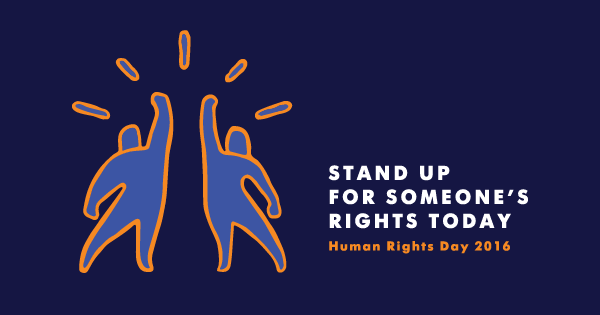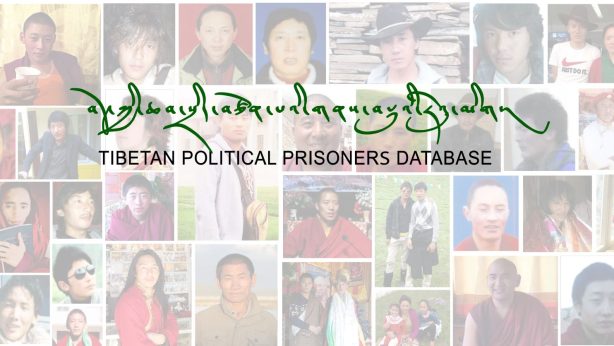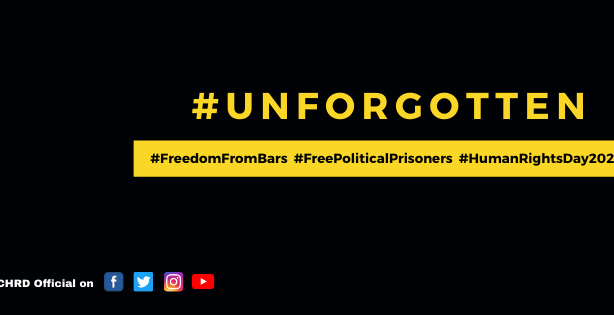Human Rights Day 2016: Stand Up for Rights and Freedoms, Stand Up to Tyranny and Oppression
 Today we celebrate the 68th anniversary of the adoption of the Universal Declaration of Human Rights (UDHR) by the United Nations General Assembly in 1948. The rights and freedoms enshrined in the UDHR affirm that we are born free and equal, endowed with inherent rights to freedom of movement, expression, thought, privacy, religion, assembly, and a decent livelihood.
Today we celebrate the 68th anniversary of the adoption of the Universal Declaration of Human Rights (UDHR) by the United Nations General Assembly in 1948. The rights and freedoms enshrined in the UDHR affirm that we are born free and equal, endowed with inherent rights to freedom of movement, expression, thought, privacy, religion, assembly, and a decent livelihood.
We now live in a highly interdependent and interconnected world where our actions will have consequences beyond our immediate surroundings. It only reinforces our common and shared humanity. Human rights know no border. Human rights are universal. Everyone is entitled to a life of freedom, dignity and prosperity. In Buddhism, the principle of interdependence teaches us that we as sentient beings are all linked and connected because interdependence itself is the nature of reality. We cannot enjoy human rights by denying the same rights to the rest of the humanity.
Today millions of people live without basic rights and freedoms that others take for granted. The world probably has not seen as many refugees as in 2016 – a result of war, environmental pollution and political suppression by repressive regimes. Millions are forced to flee their land and homes as a result of man-made violence and disasters in the Middle East, Africa and Asia. In Tibet, as a result of forced relocation and resettlement programs, thousands of Tibetan nomads are deprived of a decent livelihood and are marginalised within their own homeland. Tibetan culture, faith, way of life and livelihood are discarded as backward and uncivilised, in need of ‘modernisation’ and ‘development’. Tibetan identity struggles to survive, swamped and overwhelmed by a Chinese majority that has embedded itself in all the governance and power structure in Tibet. Millions of Tibetan nomads and farmers are losing their ancestral lands, livelihood and food security due to China’s ill-conceived development policy.
Additionally, Tibetans are punished for practicing their religion, travelling abroad to receive teachings from their spiritual leader Dalai Lama, and expressing dissent and criticism. Tibetans are forced to live in fear, suffering and suspicion, as mass surveillance becomes a part of everyday life in Tibet. With all avenues of peaceful expression criminalized, it is not surprising that Tibetans are resorting to political suicide a means to highlight Chinese government’s repressive and inhumane governance. On 8 December, two days before the Human Rights Day, a Tibetan man named Tashi Rabten died after committing a self-immolation protest in Machu County town in Kanlho Tibetan Autonomous Prefecture, Gansu Province, in the Tibetan province of Amdo. Tashi was a cousin of Tsering Kyi, the 20-yr old Tibetan woman who also committed political suicide in 2012.
China’s rise on the international stage has witnessed the single party authoritarian regime take more assertive role in various international and regional organisations and agencies. For instance, the party state was recently re-elected to the UN Human Rights Council and more recently, a Chinese police official became the president of the Interpol. Yet in the People’s Republic of China (PRC), there are millions whose human rights are not respected, protected and fulfilled. Instead the party-state continues to view human rights in aspirational terms and rejects the universality and indivisibility of human rights by prioritising ‘right to development’ as a precondition for enjoyment of civil and political rights. In a white paper issued on 1 December, the PRC reiterated that human rights are divisible and unrelated by treating economic development and the corresponding rights as supreme. “Based on its prevailing conditions, China adheres to the Chinese socialist path and to the philosophy that development is of paramount importance. China integrates the principle of universal application of human rights with the country’s reality,” proclaims the white paper. The PRC fails to recognise that non-economic rights are necessary to the achievement of all human rights.
Human rights are not about official proclamations. Not about words but about deeds. Not about governments, but about people. When we stand up for human rights of others, we must also stand up to tyranny and oppression. In times we live in when human rights are violated with impunity around the world, we as a human family need to unite and stand up for each other’s human rights. Only we can ensure, with our resolute action and indomitable spirit, a world that is free, equal, just and inclusive for all.


